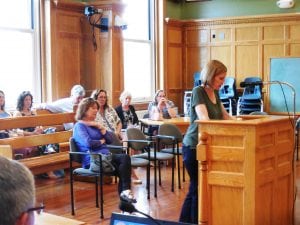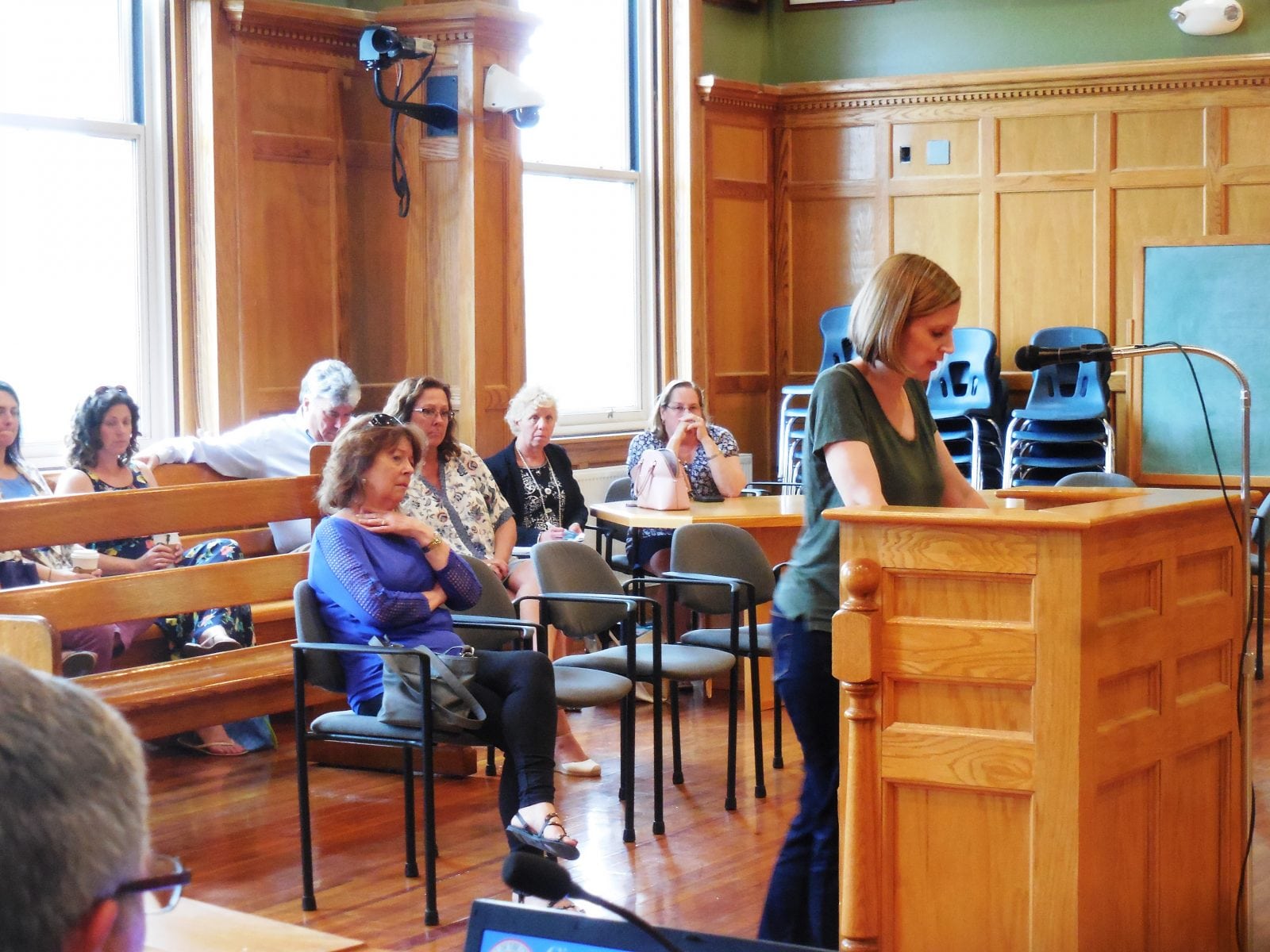
SEPAC parent Michele Douglas asks councilors not to cut the school budget at public hearing Wednesday. (Photo by Amy Porter)
WESTFIELD – About a dozen residents came to the public hearing on the budget in City Council chambers on Wednesday, and fewer spoke. City Council president John J. Beltrandi, III, who said the public hearing was the only item on the agenda, asked Finance sub-committee chair Dan Allie if he had any opening comments.
Allie said he preferred to let the public speak first, and the invitation went out.
First to speak was Michele Douglas, a member of the Special Education Parent Advisory Committee, who urged the councilors not to cut the school budget. She said with 80% of the district budget going to employees, chances were high that any cuts would mean layoffs.
Sharing her personal story, Douglas said her son goes to Munger Hill Elementary School, where there are many special education programs and students on Individualized Education Plans (IEPS), but only one board-certified behavioral specialist.
“Next year, my son’s behaviorist has taken another position. His para is also leaving. There has been no consistency with my son’s team from year to year,” Douglas said, pointing to the low salaries paid to para-professionals as a part of the program.
Douglas said she has been working hard to get the best education for her son that she can, but it has “not been easy.” She said Westfield Public Schools have great teachers and administrators, but not enough funds to provide the programs they need to provide. ”We need to think about the future, not just for special education, but for all the children,” Douglas said.
Resident Donna Vella said she has lived in Westfield a long time. She said she remembered Councilor Andrew Surprise recommending a 3% cut across the board last year, which was not very well received.
Vella said when budget time comes around the departments usually make sure they spend down their budgets, in order not to be cut due to leftover funds. She said instead of rewarding this behavior, she would recommend providing a system of reward for people who can identify redundant or wasteful spending; “rewarding behavior that is beneficial,” she suggested.
Vella also admonished the Council to make sure, if they cut the budget, to show people why it’s necessary. “We shouldn’t continue to do flowers, when we can’t even weed this stuff,” she said.
WPS Chief Financial Officer Ronald R. Rix asked for support of the district’s FY19 budget. He said he was “confident” that their proposal was frugal, and ran down a list of cost-saving initiatives taken by the district this year, including closing Russell, redistricting, employee cuts which resulted in a reduction of staff benefits to the city of $191,000, and money they will be returning at year’s end. “That will all pay for the $488,000 (net) increase to the city,” Rix said.
After no more residents came forward, Beltrandi asked for comments from Councilors.
At-large Councilor Dave Flaherty said he had received two phone calls; one from a gentleman at Munger Hill who was moving his family out of town due to the condition of the roads and the condition of the school with the taxes he’s paying. Flaherty said another family from Paper Mill was “livid” that the road hadn’t been fixed yet, as promised.
“Personally, I think the Mayor did an okay job with it; it was a hard budget,” Flaherty said, adding that the Mayor had even made last minute cuts to address people’s tax increases. Flaherty called the school district “the elephant in the room,” and asked what the city would have done if they hadn’t closed Russell Elementary. Flaherty said he would likely be opposed to passing the budget next week.
Ward 6 Councilor William Onyski responded to the comment about Paper Mill Road, which is in his district. He said the road would be fixed over the summer.
Ward 1 Councilor Mary Ann Babinski said she had also had an email from resident Rachel Bullock, a mother with two children in special education programs, who said the school budget is too small to cover special needs, and that out of district placement is far more expensive. Bullock also said in her email that the loss of 70 students and the resulting state aid to a charter school in West Springfield is the result of “nickel and diming.”
Surprise said he received an email from Kristen Mello opposing an increase in property taxes of $3.1 million and a tax increase of $1.3 million, for a total cost to taxpayers of $4.4 million.
School Committee member Ramon Diaz, Jr. commented on the cost of sending kids out of district. He said WPS started a special education program several years ago in the elementary school that is now in the middle school, and needs to be in Westfield High school. He said the program cost $700,000 to implement, the majority of the increase in the budget, but saves the district $3.6 million. “Also consider all the work that we’ve done,” Diaz said, referring to the School Committee.
Flaherty responded that of the top ten budgets by size in the city, the school district was number one with a budget of $61.2 million. Other departments that Flaherty said were in the top ten included Pension, Police Department, Fire Department, Highway, Trash, and Medicare. He said every other department in the city combined totaled $13.9 million. “There are major problems. There is no easy fix, no easy cuts,” he said.
Allie said the Mayor’s budget contains a 2 ½ percent increase, including using $1 million from Free Cash, and $1 million from health savings. “There are no plans for a health care holiday this year,” Allie said.
He also said new growth in the city is $1.3 million this year. “The government has to do a better job. We’re a community, we have to figure out a way to fix the roads,” Allie added.
“The Mayor did a great job of making cuts. We need to make more cuts, not because departments can handle cuts, but because residents can’t handle tax increases,” Surprise said, adding that the major increases were in contracts. “We can’t afford that,” he said.
Beltrandi said looking around the room he counted 15 people, many who were city employees. “Nobody’s here,” he said. He then thanked everybody who did come for showing up, and closed the public hearing.
“People want services, but they don’t want taxes going up. Contact your councilor and tell them where you want them to cut,” Babinski said after the meeting ended.








